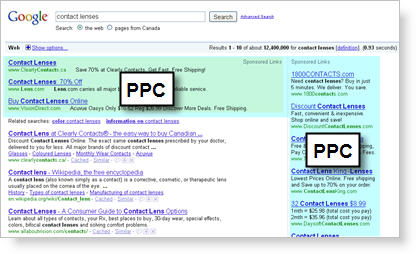 So, what is Pay Per Click? In a nutshell, Pay Per Click (PPC) marketing is a type of advertising that only costs you money when someone clicks on your ad. The most popular example is Google AdWords – you’ll see these ads on the side of search results on Google. As someone who handles multiple PPC accounts for our website builder, one of the most exciting things I get to do is introduce it to people building a new ecommerce website. Why? It’s like a fresh canvas: a clean start to build something great.
So, what is Pay Per Click? In a nutshell, Pay Per Click (PPC) marketing is a type of advertising that only costs you money when someone clicks on your ad. The most popular example is Google AdWords – you’ll see these ads on the side of search results on Google. As someone who handles multiple PPC accounts for our website builder, one of the most exciting things I get to do is introduce it to people building a new ecommerce website. Why? It’s like a fresh canvas: a clean start to build something great.
One of the biggest problems I often see is new PPC users jumping right in with no plan, no goals, and no real strategy for what they want to achieve, and it’s pretty easy to waste a lot of money on it. That’s why I was thrilled to learn that I’d be talking PPC with Marco and Heather Barberini from OvernightPetTags.com, our winner of the 2009 Homepreneur of the Year competition.
Every successful PPC campaign begins with planning offline. So before we even turned on the computer, I asked Marco exactly what his vision and goals were for his Google Adwords account. Google currently holds a 64% market share of all searches in the U.S.
Here’s what I asked Marco, and here’s what you should ask yourself before you take the plunge into Pay Per Click marketing.
1. What is the main reason to start a PPC account?
Obviously, to get more sales and make more money. But how are you going to do that? Are you going to be acquiring leads then calling them? Do you want to drive traffic directly to a specific product? Or do you want to to drive traffic to a catalog of products? Maybe you offer a service and want people to phone you right away after finding your business website. Even if you have an entire list of possibilities, write them all down.
2. What are you selling?
Of course you know what you’re selling, but can you organize it effectively? Create a tree of your website and all of your products. Make yourself a map and organize your products or services into different categories. In Marco’s case, he sells pet ID tags. So he would start by categorizing his website into two main top level categories: Dog ID Tags & Cat ID Tags. These new main categories would be his “Campaigns”.
3. How would you break down each individual product or service in each campaign?
Once you have broken your site down into its main categories or “campaigns”, you have created a backbone to structure the rest of your account. You can then break things down further into Ad groups which fall under campaigns. For example, the Ad group “Sports Dog ID Tags” would go under the Campaign “Dog ID Tags” mentioned above.
4. Who are you selling to?
You might know who you are selling to offline, but online is different. When you’re advertising online, anyone can search and possibly click one of your ads costing you wasted money if they aren’t “qualified” (a good fit for your products). So, make a plan offline for who you want to target. Age, gender, what they might be searching for and why? Try to create a customer persona and paint of picture of who you’re selling to.
Again, planning is the key to a great start with any new PPC account. There are many other factors to consider, such as budgets – what are you willing to pay to get a new customer or sell a product? These four tips above are just the basics to get your head wrapped around how to start.
Here is a list of key questions to ask yourself as your draw up your plan:
- What search engines do you want to target?
- What is your monthly budget?
- How many products are you selling? (this should help you break down your categories)
- What are your goals for PPC? (i.e. traffic, conversions)
- What will you use for track? (Our recommendation is Google Analytics but you may prefer Hitslink or StatCounter)
- How much are you willing to spend if it converts well?
In my next post, we’ll break it down further and discuss Ad groups, Keywords and Ads. In the meantime, grab a pen and paper and start planning!

